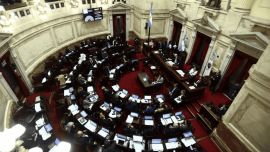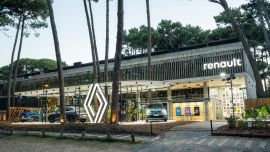The time for criticism is over – now is the time to turn the page and unify the voices of the Inter-American Development Bank's stakeholders to lift Latin America out of the economic crisis caused by the coronavirus pandemic, says Mauricio Claver-Carone.
"We have closed that chapter," the institution's new president told The Associated Press, referencing the controversial vote last Saturday that saw him confirmed as the institution's first president from outside Latin America in its six decades of existence. "Now we go to the chapter with the mandate we have ... to focus on unifying management."
The 45-year-old lawyer, who was nominated for the post by US President Donald Trump, stressed that a priority of the IDB will be to help the countries of the Americas recover from the most severe crisis of the century and lead them back to economic growth.
Claver-Carone, whose election breaks with an unwritten tradition of Latin Americans leading the IB, received 67 percent of votes and the backing of 23 of the 28 countries in the region.
Referring to recent criticism, Trump's advisor for Latin American issues, remarked that no nation was opposed to his management or vision, only to the fact that he is from the United States. He also observed that the backing he won was higher than the 56 percent obtained by the IDB's outgoing president, Luis Alberto Moreno, when the Colombian was elected to the post in 2005.
"In terms of message, agenda and vision, there could not be more cohesion now," he said.
Last Saturday's election took place in a closed virtual session of the bank's Board of Governors. A number of countries in the region, including Argentina, criticised that move and asked for more time, as well as expressing dismay that the United States had nominated a candidate without prior consultation.
As well as the Alberto Fernández administration, Chile, Mexico and Costa Rica were also critical, with all calling for the election to be postponed until at least March 2021, claiming that it could wait to be done in person once the coronavirus pandemic had passed.
Finally, Argentina and Mexico – two of the countries with the most invested in the race – came forward to provide quorum for the election, although they abstained from voting.
In contrast, Colombia, Brazil, Paraguay, Bolivia, Ecuador and El Salvador, among others, supported Claver-Carone from the beginning.
The vote is secret and the IDB did not reveal who voted for the new president, or who abstained.
Claver-Carone said he had recently spoken with the Foreign Minister of Mexico, Marcelo Ebrard, and several ministers, highlighting the strength of bilateral relations.
"We are going to work together with all these countries," he added.
Latin America is going through one of the deepest economic crises in history. According to forecasts by multilateral organisations, the regional economy will contract more than nine percent this year.
Experts and analysts say that multilateral financial organisations and their lending will be essential for the recovery. The IDB is the bank that offers the most money each year to these countries: about US$13 billion in total.
On Monday, at a conference organised by the Atlantic Council educational and debate forum, Moreno –– who still chairs the body –– said he is concerned about the debt that Latin America will hold after the pandemic. Covid-19 is generating a tremendous contraction and a sharp drop in world trade, something that will affect the region strongly, he said.
Foreign debt in the region was 40 percent a decade ago, close to 58 percent at the beginning of this year and, according to Moreno, it could be as high as 75 percent in the next 18 months.
Claver-Carone, Trump's advisor on Latin American issues for the National Security Council, is known as one of the architects of Trump's heavy-handed approach in the region, deploying policies and sanctions against Cuba, Venezuela and Nicaragua.
He said that his administration will focus on improving cohesion with other organisations such as the World Bank and the International Monetary Fund to create joint platforms to coordinate aid to each country more efficiently.
He added that he will work on the bank's capitalisation process so that the money that is loaned can be increased to at least US$17 billion annually. The idea is to start the negotiation process in October, so that it can be addressed in March.
Some critics said they fear that the US official will transfer Washington's agenda to the IDB, distancing the entity from its existing independent and multilateral character.
"What we are going to create here is the opposite," he said after explaining that he wants to bring transparency to the institution. As of October 1, when the five-year presidency begins, "I will work for all the shareholders" of the IDB.
– TIMES/AP
by GISELA SALOMON, Associated Press



















Comments